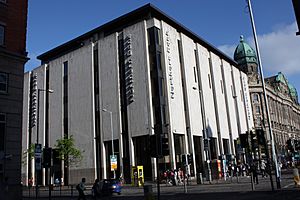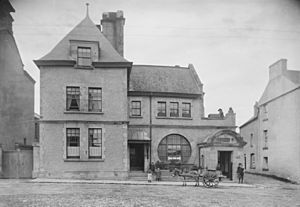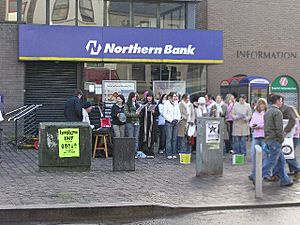Danske Bank (Northern Ireland) facts for kids

The bank's main office in Belfast before it was renamed Danske Bank.
|
|
|
Trade name
|
Danske Bank |
|---|---|
| Private limited company | |
| Industry | Financial services |
| Founded | Belfast, Ireland (1824) |
| Headquarters | Belfast, Northern Ireland |
|
Area served
|
United Kingdom (previously also served Republic of Ireland) |
|
Key people
|
Martin Stewart (Chairman) Vicky Davies (CEO) |
| Products | Commercial banking |
| Parent | Danske Bank A/S |
Northern Bank Limited, which is known to the public as Danske Bank, is a major retail bank in Northern Ireland. It is one of the oldest banks in Ireland, with a history that goes all the way back to 1809. The bank officially started as the Northern Banking Company Limited on August 1, 1824.
In November 2012, Northern Bank started using the name of its parent company, Danske Bank. It is a top bank in Northern Ireland and is also growing in other parts of Great Britain. A special feature of this bank is that it prints its own money, called banknotes, for use in Northern Ireland.
Contents
The Bank's Long History
The bank began in 1809 in Belfast as a private bank called the Northern Banking Partnership. It was started by four merchants. In 1824, it became a Joint Stock bank, which means it was owned by many investors. The bank grew and opened branches all over Ireland.
In 1965, a large London-based bank called Midland Bank bought Northern Bank. Midland Bank already owned another bank in Northern Ireland, the Belfast Banking Company. In 1970, these two banks were combined into one, but they kept the name Northern Bank Limited.
A New Owner from Australia
In the 1980s, Midland Bank had some financial problems and had to sell some of its other companies. In 1988, it sold Northern Bank to the National Australia Bank.
After being bought by National Australia Bank, Northern Bank got a new logo, a stylish "N" inside a hexagon. The name "Northern Bank" stayed in Northern Ireland, but its branches in the Republic of Ireland became a separate company called National Irish Bank.
Joining the Danske Bank Family
In December 2004, the Danske Bank Group, which is based in Denmark, bought Northern Bank and National Irish Bank. This was a big change, and Danske Bank invested a lot of money to improve Northern Bank's technology and services.
On November 19, 2012, the bank officially changed its public name from Northern Bank to Danske Bank. The first new signs were put up at its main office in Belfast. Even though it's called Danske Bank, the official company name is still Northern Bank Limited. This is why the money it prints says "Danske Bank is a trading name of Northern Bank Limited."
How the Bank is Run
As of 2021, the CEO (the person in charge) of Danske Bank UK is Vicky Davies. The bank is split into three main parts:
- Personal Banking: This part helps individual people with their bank accounts, savings, and loans.
- Corporate & Business Banking: This part works with small and large companies.
- Great Britain: This part focuses on the bank's services in England, Scotland, and Wales.
Printing Its Own Money
Danske Bank is one of the few banks in the United Kingdom that is allowed to print its own banknotes. These notes are in pound sterling, the same currency used in the rest of the UK, and have the same value as notes from the Bank of England.
After the bank changed its name in 2012, new banknotes printed from 2013 onwards have the Danske Bank logo. Older notes with the Northern Bank name are still used until they are gradually replaced. The bank now mainly prints £10 and £20 notes.
A special £5 note was made in the year 2000. It was made of polymer (a type of plastic) instead of paper. This made it very durable and was the first plastic banknote issued in the UK.
The pictures on the banknotes celebrate famous people and places from Northern Ireland. Most notes show the front of Belfast City Hall on the back. Here are the people featured on the front of the notes:
| Value | Person on the Front | Why They Are Famous |
|---|---|---|
| £5 | US Space Shuttle | A special note for the Year 2000 |
| £10 | J. B. Dunlop | He invented the first air-filled tyre in Belfast. |
| £20 | Harry Ferguson | An inventor famous for the Ferguson Tractor. |
| £50 | Sir Samuel Cleland Davidson | He was a pioneer in creating air conditioning systems. |
| £100 | Sir James Martin | He invented the ejector seat for airplanes. |
The 2004 Banknote Theft and New Designs
In December 2004, a very large amount of money was stolen from the bank's main cash center in Belfast. Because of this major theft, the bank decided to recall all of its old banknotes to make sure the stolen money could not be used.
On January 7, 2005, Northern Bank announced it would print completely new banknotes with new designs and colors. The new notes started to appear in March 2005. For example, the old brown £10 note was replaced with a new green one, and the old purple £20 note was replaced with a blue one. This helped everyone easily tell the difference between the old, stolen notes and the new, safe ones.
New Plastic Banknotes
In 2019, Danske Bank started to release new banknotes made of polymer. The first one was a new £10 note, followed by a new £20 note. These plastic notes are cleaner, safer, and last much longer than paper money. They keep the same famous people on the front but have updated designs and security features.
 | Delilah Pierce |
 | Gordon Parks |
 | Augusta Savage |
 | Charles Ethan Porter |






